Why Total Facility Management Is Essential for Organization Success
Total Facility Management (TFM) offers as a cornerstone for company success by balancing varied functional aspects such as maintenance, area use, and safety and security steps. As services navigate an affordable landscape, understanding the complex advantages of TFM can be crucial in driving cost effectiveness and enhancing staff member efficiency.
Recognizing Total Facility Management
Total Facility Management (TFM) incorporates an extensive technique to taking care of an organization's structures and associated services to make sure optimum functionality, safety, and performance. TFM incorporates various disciplines, consisting of maintenance, operations, space management, and safety protocols, to develop a cohesive framework that sustains a company's core goals.
At its core, TFM aims to enhance the procedures involved in facility management, reducing redundancies and improving service delivery. This method entails the coordination of tasks associated with property management, such as fixings, cleaning, and power management, to foster a productive environment for workers and stakeholders alike. TFM likewise stresses the significance of carrying out ideal techniques and cutting-edge modern technologies to improve solution quality and reduce functional costs.
By lining up facility management tasks with organizational objectives, TFM boosts overall performance while ensuring conformity with health and wellness, safety, and environmental guidelines. Therefore, TFM serves not only as a logistical function yet also as a critical asset, adding to an organization's long-term sustainability and growth.
Secret Benefits of TFM
Leveraging a thorough technique, organizations that carry out Total Facility Management (TFM) unlock a myriad of advantages that add to total organization success. Among the primary benefits of TFM is the enhancement of functional efficiency. By consolidating facility solutions under a unified management framework, organizations can improve processes, lower redundancies, and improve communication throughout divisions.
Furthermore, TFM advertises an aggressive upkeep strategy, which minimizes downtime and expands the life expectancy of facilitiess and devices (Total Facility Management). This aggressive approach not only enhances productivity yet additionally cultivates a more secure working atmosphere, inevitably bring about greater worker contentment and retention rates
In addition, TFM assists in much better source allowance by offering understandings into facility efficiency metrics. Organizations can recognize locations for improvement, allowing them to make educated decisions that straighten with their tactical goals.
TFM and Expense Performance
Attaining cost effectiveness is a basic objective for organizations, and Total Facility Management (TFM) plays a critical role in this undertaking - Total Facility Management. By integrating various facility services under a solitary management structure, TFM makes it possible for companies to enhance operations and lower redundancies. This all natural approach leads to significant cost savings, as it removes the need for numerous vendors and streamlines procurement procedures
Additionally, TFM fosters aggressive maintenance approaches, which lessen the risk of expensive repair work and downtime. By focusing on precautionary actions, organizations can expand the life expectancy of their properties and decrease unanticipated expenditures. In addition, TFM integrates power management methods, which can dramatically reduce utility prices through effective source usage.
The centralization of information and analytics within TFM allows organizations to make enlightened financial decisions. By recognizing trends and areas for enhancement, TFM makes it possible for tailored methods that better enhance expense management. Furthermore, the scalability of TFM services makes sure that as companies grow, their facility management methods continue to be efficient and aligned with monetary objectives.
Enhancing Worker Efficiency
A well-managed facility can dramatically boost employee productivity by creating a favorable work atmosphere. Efficient Total Facility Management (TFM) guarantees that all elements of the work environment-- from illumination and temperature level to tidiness and security-- are enhanced. When workers operate in an area that is comfortable and well-maintained, they are more probable to focus on their jobs, causing greater outcome and task fulfillment.
Additionally, TFM can improve partnership through the strategic design of public locations, motivating team effort and development. By investing in the appropriate sources read the article and innovation, organizations can facilitate smooth interaction and improve workflows, further boosting efficiency. Routine upkeep and punctual reactions to facility concerns stop disruptions that could or else impede efficiency.
Additionally, a healthy and balanced and risk-free workplace, supported by TFM techniques, decreases absence and promotes well-being, straight correlating with raised efficiency degrees. Eventually, prioritizing facility management is an investment not just in physical possessions but likewise in the workforce itself. By promoting an environment that sustains employee requirements and preferences, services can cultivate a much more involved and effective labor force, driving overall success and affordable advantage.

Future Trends in TFM
Accepting technical developments is readied to improve the landscape of Total Facility Management (TFM) in the coming years. As the demand for performance and sustainability increases, TFM will increasingly adopt wise building innovations, incorporating Net of Points (IoT) tools to monitor and manage facility operations in real-time. This shift will certainly enable proactive upkeep, significantly reducing operational costs and boosting solution shipment.
Sustainability stays a critical focus, with TFM specialists expected to focus on environmentally friendly techniques. This includes using renewable resource resources and maximizing waste management systems to minimize the carbon impact of facilitiess.
Remote management capabilities will likewise be increased, permitting facility managers to supervise operations from essentially anywhere. This adaptability will certainly become important as organizations adjust to crossbreed job versions. In summary, Full Article the future of TFM is poised for transformation through innovation, sustainability, and improved functional methods, making certain organizations remain affordable in an evolving landscape.
Conclusion
Finally, Total Facility Management is a critical component for attaining business success. By incorporating numerous functional features, TFM improves effectiveness and lines up facility management with business purposes. The resulting expense financial savings, enhanced employee productivity, and safer workplace add considerably to overall performance. As organizations significantly embrace lasting practices and innovative modern technologies, the value of TFM will remain to expand, making sure long-term functional performance and competitiveness in an evolving industry.
